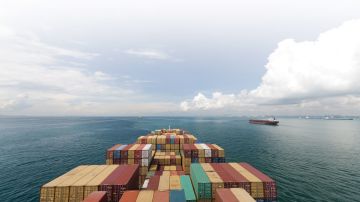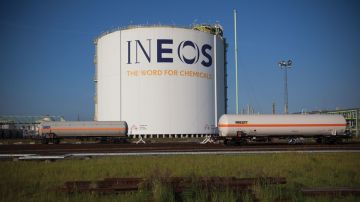With Europe facing pressure from outside and within, it has never been more important for management and unions to work together to find solutions. INCH spoke to union representatives from Norway, Italy and Germany about what they believed INEOS needed to do to remain competitive and how they could help.
They say marriages are made in heaven.
That may well be the case for the defence. But anyone who is married knows they can also be fraught with difficulties.
The key to survival is openness, honesty and fairness. Thomas Meiers, the union representative at INEOS Köln, says openness, honesty and fairness are equally as important in business too.
“We work closely with INEOS and that’s a good thing,” he said.
He said discussions were often intense but that was something INEOS actively encouraged.
“Sometimes the discussions between us can get heated, but because we are allowed to be open, all of us can spot any potentially dangerous situations and deal with those potential problems at a very early stage,” he said.
Those frank, on-going discussions, he said, meant the union and management could thrash out the best way to approach a particular issue, and find a solution that satisfied all.
“Usually the outcome ensures both further economic successes and competitiveness for the company as well as decent working conditions and welfare for the workforce,” he said.
And it seems to be working.
The Köln site of INEOS Olefins & Polymers is one of the most profitable in Europe.
Thomas believes that INEOS’ flat management structure, the way it conducts its business and the fact that staff identify with the company and its aims, have all contributed to that.
“Our approach to industrial relations at INEOS is so unique,” he said. “It’s also what makes us sustainable and successful.”
Working together towards a common goal is also what motivates Wenche Jansen Tveitan, the union representative at INEOS’ Olefins & Polymers plant in Norway.
“Any workplace needs to have the staff on board if it wants to remain competitive,” she said.
“And an open relationship, built on trust, is built through openness.”
She said regular informal contact between the union reps and management had been the key to building that trust.
“Any difference of opinion is brought to the table as soon as possible and not left until the next works’ council meeting,” she said.
Management, she said, also used the union as a sounding board.
“When that happens, the employees can play an active part and contribute to even better solutions in the end,” she said.
That kind of approach is critical, especially in today’s fast-paced, ever-changing and competitive world. Many petrochemical companies are currently investing most of their money in the US rather than Europe because of America’s access to cheap feedstock and energy.
With Europe now one of the most expensive places in the world to manufacture petrochemicals, Wenche believes the union can directly – and indirectly – ensure INEOS remains competitive.
She said that was especially important in Norway where the cost of living is high.
“Our site depends on good performance – all the time,” she said.
“We do that by showing our investing in our site yields a good profit.”
Wenche said the union was equally as concerned as management about energy prices and taxes – and had often lobbied the government and organisations to try to influence policies that might affect the smooth running of INEOS’ O&P site in Rafnes.
“The co-operation between management and unions is of great importance in this regard,” she said. “Together we’re stronger.”
Wenche said the union had recently played an important role in setting up meetings with politicians.
“We work constantly to show what challenges the land-based industry is facing and what should be done to solve these,” she said.
“Together we have managed to get some tax relief and advantageous energy agreements which have improved our competitiveness.”
She said the union had also played an important part when both the Prime Minister, Minister of Finance and leader of the Standing Committee on Business and Industry visited Noretyl/O&P in Norway.
Tom Crotty, INEOS Group director said it was important for the unions to be working on solutions with management.
“The relationship with the unions in Köln and Rafnes is fantastic,” he said.
“They want to understand the business’ targets and they want to help both indirectly and directly.
“They are quite prepared to talk about whether practices need to be changed but also indirectly in how they can put pressure on government and assist you.”
Italy’s union representatives expressed similar views to their colleagues in Norway and Germany.
“Close dialog and co-operation between the company and us is very important,” said Stefano Santini, union representative at INEOS’ O&P site in Rosignano, Italy.
“Over the years we have, together, built up a mutual confidence and trust due to the various commitments taken and then honoured.”
In September Total announced it was planning to shut down a loss-making steam cracker in Carling, France.
Patrick Pouyanné, President Refining & Chemicals and member of the Executive Committee of Total, blamed growing international competition.
“The European petrochemicals market is facing continued overcapacity,” he said.
The cracker, which refines crude oil into chemical components to make plastics, is due to close in 2015.
The announcement has worried INEOS staff at Rosignano.
“The fear here is that this closure could potentially hit also the personnel working in the site of Saralbe,” said Stefano.
He is worried – as are many – about the spiralling cost of energy and feedstock in Europe.
“We need to work on the energy saving, especially reducing the energy waste by using equipment with low energy consumption,” he said.
“We also need to review the energy contracts, and try to produce energy ourselves for the site, and invest in alternative energy sources like the ones coming from use of biomasses.”
He said, from a union perspective, INEOS needed to invest in research to develop innovative products, which demanded technical and structural expertise.
“We could also invest in finding easier ways to access raw materials,” he said
Five things that will help the European chemical industry remain competitive:
-
Cheaper energy:
A policy shift towards reducing EU energy costs is seen as vital to drive innovation and investment, create jobs and growth and ultimately help to cut greenhouse gases. -
Better regulation:
The EU’s chemical legislation, Reach, is already viewed as one of the most burdensome pieces of legislation in Europe. The chemical industry has so far complied with it and registered all chemical substances that are manufactured or imported in quantities of more than 100 tons per year. But there is more to come. Under ‘phase 3’ companies, which produce one to 100 tons per year, must register those substances. That will affect nearly every chemical company in the EU and all their customers. -
A Transatlantic Trade & Investment Partnership:
The proposed TTIP would see import duties scrapped on the €48 billion worth of chemicals traded in 2012 between America and Europe. Cefic would like to see all chemical tariffs eliminated, and hopes the negotiations, which are expected to be finalised in two years, will lead to greater regulatory transparency and co-operation. -
Retention of Key Enabling Technologies:
KETs, as they are known, are seen as critical to re-energise the EU economy. At the moment, although Europe is a global leader in KETs research and development – with a global share in patent applications of more than 30% – it is not translating that research into the production of processes and products needed to stimulate growth and jobs. -
Protection of its trade secrets:
The European Commission is being urged to ensure adequate systems are in place to ensure European innovation know-how is protected. Moving breakthrough ideas to market are viewed as the best way for EU industry to stay ahead in an increasingly competitive global race.















